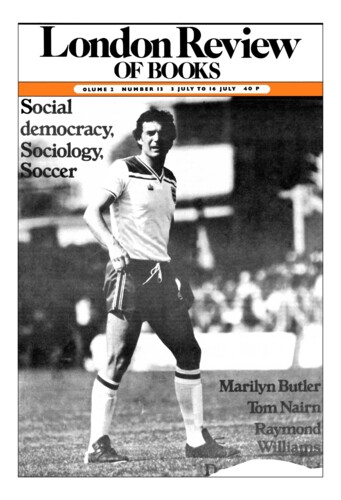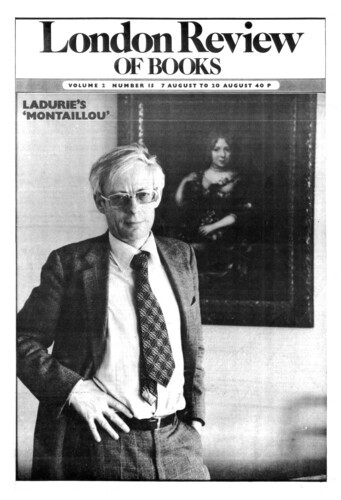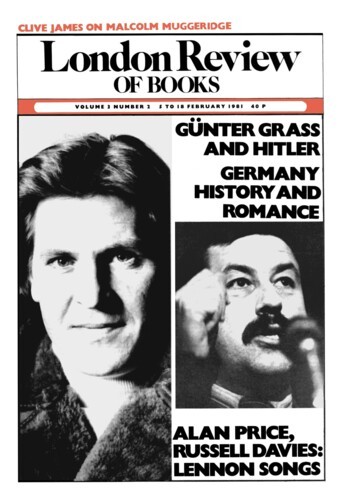Hans Keller
Hans Keller, who came to Britain in 1938 after the Anschluss, worked for many years for the BBC’s Music Department. He wrote for the BBC magazine the Listener, and when Karl Miller and Mary-Kay Wilmers, who had both worked there, started the LRB he began to write for it too, and to send many combative letters to the editors. ‘Dear Hans,’ Miller wrote to him in 1980, ‘Every day I find a large accumulation of letters of contention and complaint addressed to me. Most of them are from you.’ He died in 1985 and is pictured on the cover of the LRB of 3 September 1987, to accompany a piece about him by Donald Mitchell. Nicholas Spice wrote about his life and his criticism in the paper in 2021.
Music on Radio and Television
Hans Keller, 7 August 1980
There is no area of human endeavour on which we get a greater variety of opinions than on broadcasting, for the simple reason that everybody not only is but feels involved – as a listener and/or viewer, a broadcaster, or one who hates it all and makes a moral issue of it: I know more than one respectable mind who refuses to have a television set in the house – for his family’s sake and indeed his own. With a fair measure of boredom, then, the reader will expect yet another opinion from me – or rather, not another: by now, it is impossible for any opinion to be new.
BBC Music
7 August 1980
Hitler and History
Hans Keller, 5 February 1981
My title is intended to be quadruply functional: the four books raise four interpenetrating problems – and not one problem per book either. That Hitler himself remains an incurable problem is proved by our civilisation’s continued, compulsive preoccupation with his personality – which a George Steiner even undertook to reinvent: his The Portage to San Cristobal of A.H. has been reviewed in these pages, nor are Norman Stone, James J. Barnes and Patience P. Barnes always less fanciful. And if Hitler’s personality remains an unanswered question, so too, does the history of National Socialism – which a book like Robert Harbison’s recent Deliberate Regression: The disastrous history of Romantic individualism in thought and art, from Jean-Jacques Rousseau to 20th-century fascism (1980) interprets as dreamfully as Steiner recreates Hitler. The reason why I quote Harbison’s enormous subtitle in full is that it is symptomatic of one of our intellectual age’s grand delusions – of the belief that Hitler has a specific history in German Romanticism. It is a delusion which Peter Paret and especially William Vaughan are quite ready to take for reality, while Norman Stone’s own dreams about ‘the positive qualities of Hitler, his real achievements’ (thus Professor J.H. Plumb’s Introduction) aid and abet it: if Hitler was some sort of genius, he is part of the history of German, nationalistic genius. The whitewashing of Hitler goes together with the soiling of his past.
Hitler and History
5 February 1981
Pieces about Hans Keller in the LRB
Keller’s Causes
Robin Holloway, 3 August 1995
In his heyday, from the late Forties to around the start of William Glock’s regime at the Third Programme (afterwards Radio Three), Hans Keller’s vehement presence was a force for the...
Aghast
Philip Booth, 30 December 1982
The husband-and-wife team of Hans Keller and Milein Cosman looks at Stravinsky in his later years from two very different points of view: on the one hand, that of the rational music critic and...
Read anywhere with the London Review of Books app, available now from the App Store for Apple devices, Google Play for Android devices and Amazon for your Kindle Fire.
Sign up to our newsletter
For highlights from the latest issue, our archive and the blog, as well as news, events and exclusive promotions.



